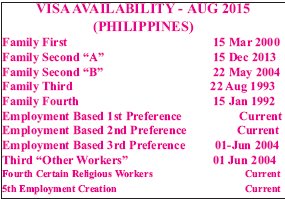By: Robert Gard
 Actions — Status of Implementation & Political Infighting — Part 6
Actions — Status of Implementation & Political Infighting — Part 6
Two key pieces (expanded “DACA” without age limits and “DAPA”) of President Obama’s Executive Actions Program, announced on November 20, 2014, were or are scheduled to go into effect on February 18th and May 26th of this year, respectively; but legal and political hurdles to implementation remain. On November 20, 2014, President Obama announced his “immigration accountability executive action,” which includes a series of measures that are first steps towards common-sense reforms to an outdated immigration system. The series of executive actions presented by the administration range from new temporary immigration protections for many unauthorized parents of U.S. citizens and lawful permanent residents to highly technical regulatory proposals to fix outdated visa provisions. The USCIS website has a DACA page/link, where the public can sign up for emailed instructions, updates and further developments: http://www.uscis.gov/immigrationaction
Status of Implementation and Political Infighting: Republicans have vowed to fight Obama’s immigration plan, charging the president overstepped his constitutional powers in taking the executive action. More than half of the States have sued the President, and they strategically “forum shopped” for a Federal District Court and a Federal District Judge who would be most likely to favor their position; settling on the Southern District of Texas, Brownsville Division, and Judge Andrew S. Hanen (appointed to the Federal Bench in 2002 by President George W. Bush). As of the date of my last article, Judge Hanen had issued a 123 page decision on February 16th, putting in place a preliminary injunction temporarily blocking implementation of President Obama’s new deferred action initiatives (expanded DACA and DAPA), while pointedly leaving the original 2012 version of DACA untouched and undisturbed. Judge Hanen indicated that his preliminary injunction was for the purpose of providing time for a coalition of 26 states to pursue a lawsuit seeking a permanent injunction against the President’s new deferred action initiatives. The Obama Administration then filed an emergency Motion to remove the injunction ordered by Judge Hanen on February 16th, and the Department of Justice (“DOJ”) has also appealed Judge Hanen’s decision. The 5th Circuit Court of Appeals granted the Obama administration’s request for an expedited appeal, which could ultimately cut down the number of months before the court reaches a final decision.
The 5th Circuit Court of Appeals held oral arguments on the Emergency Motion for a Stay of Judge Hanen’s decision on April 17th, with a decision on the Motion expected shortly thereafter. On Tuesday, May 26th, a three judge panel of the U.S. 5th Circuit Court of Appeals, by a vote of two to one in what appeared to be an overtly politically influenced ruling, chose to leave Judge Hanen’s injunction in place, and has set a date of July 10, 2015 for a hearing on the full appeal.
On June 29th, the 5th Circuit announced the three Judge panel who, on July 10th, will be hearing the full appeal on the merits. To the dismay of the Obama Administration and immigration advocates, the three Judge panel selected to hear the full appeal on the merits includes both of the Judges from the previous panel who ruled to leave Judge Hanen’s injunction in place, and opined that the Obama Administration had overstepped their legal bounds in pursuing the Executive Actions without going through the formal rulemaking process.
Fifth Circuit Court Judges Jennifer Walker Elrod and Jerry Smith, both Republican appointees, in May ruled against the Obama administration’s request to proceed with the executive actions — which would protect more than 4 million immigrants here illegally from being deported — while the larger case on the legal merits of the new programs winds through the courts. Many observers expected a different panel of Judges, so the selection of two Judges known to be hostile to the Administration’s position was a most unwelcome surprise.
If the Administration were to win at the appeals court later this summer, it is possible that Mr. Obama could order the program to begin later this year, however it’s very likely that whoever lost at the appeals court would ask the Supreme Court to consider the full merits of the president’s actions. If the Supreme Court agrees to hear the case, it would likely hear arguments during its term that begins in October 2015 and could issue a ruling the following June (2016).
That would mean that the legal fate of the President’s immigration program would be decided just as the fall campaign for the 2016 presidential contest heats up, and would become just another “political football.” Another option that few commentators seem to be discussing is simply to publish the new proposed rules in the Federal Register, and go through the regular rulemaking process used for most regulatory changes (which probably should have been done in the first place.) While this would delay implementation for a few months, it would completely blunt one of the main arguments of the opposition.
Getting the Most Out of Your Call to USCIS National Customer Support Center (NCSC)
U.S. Citizenship and Immigration Services (USCIS) directs customers who have questions about immigration services and benefits, or who wish to inquire about the status of a specific case, to call the agency’s National Customer Service Center (NCSC) at 1-800- 375-5283. The NCSC operates on a “two- tier model.”
Tier 1 Customer Service Representatives (CSRs):
Can
• Relay basic immigration information to customers through scripts provided by USCIS
• Answer questions about USCIS forms
• Transfer calls to Tier 2 in certain circumstances
Cannot
• Answer specific questions about a case with the exception of information available through Case Status Online
• Transfer calls to local offices or service centers where cases are pending
• Provide legal advice
Tier 2 Immigration Service Officers (ISOs):
Can
• Review USCIS systems on your case
• Request that notices be reissued
• Provide information that you may receive at an Infopass appointment
• Provide specialized assistance to dependents or active members of the U.S. Armed Forces
• Provide information on pending and adjudicated cases.
Cannot
• Review already issued Requests for Evidence (RFEs)
• Directly issue duplicate notices, receipt notices, RFE notices
• Transfer calls to local offices or service centers
• Provide legal advice How to Prepare for My NCSC Call?
• Gather as much information on your case as possible
• Check the status of your case online
• Determine what, if any, processing times apply to your case type
• Check your priority date, if applicable
• Have available all applicable receipt numbers
• Have your Alien Registration number (“A” number), if applicable
• Have all relevant correspondence with USCIS What to Do During My Call?
• Record the date and time of the call
• Request the name and/or ID number of NCSC staff
• Note the service request referral number, if applicable
Service Requests
Both Tiers 1 and 2 can create a “service request” which is sent to service centers and local offices on matters such as expedite requests, change of address, appointment rescheduling, case processing delays which exceed the posted times, and other matters that may be unique to a specific case.
Inquiries for Field Office Matters
If USCIS has not responded to your initial service request within 30 days, call the NCSC. Please have the initial service request referral number with you when you call. COPYRIGHT BY AUTHOR – – 2015 This article is designed to provide accurate and authoritative information in regard to the subject matter covered. It is published and distributed with the understanding that the publisher is not engaged in rendering legal, accounting or other professional service. It is submitted for publication by the author with the understanding that each individual case is different, and this article is not a formal legal opinion and should not be relied upon as advice by the author in a particular legal situation.
Mr. Gard has been engaged in the practice of immigration law since 1977. He is a frequent writer and lecturer in the American Immigration Lawyers Association and has served that professional organization as a Chapter Chair of the Greater Chicago Chapter, and as a Director. Written questions may be submitted to Mr. Gard.
selected questions or issues may be addressed in subsequent articles. Mr. Gard is available for appointments for consultation in immigration law-related matters at the law offices of Immigration Attorneys, LLP, 203 North LaSalle Street, Suite# 1550, Chicago, Illinois 60601, Contact Information (email is the preferred method of contact): e-mail: rgard@immattyllp.com Telephone: (312) 661-9100 ext.
8943; FAX: (312) 661-9021; Our firm has several multi-lingual lawyers engaged in the practice of immigration law, and also has lawyers available for criminal and civil litigation and health care facility/medical practice and licensing issues. The firm also has offices in Milwaukee (WI), Tampa (FL), and Phoenix (AZ).
 VIA Times – July 2015 Issue Vital News, Vibrant Views for Asian Americans in Chicago & Midwest
VIA Times – July 2015 Issue Vital News, Vibrant Views for Asian Americans in Chicago & Midwest


